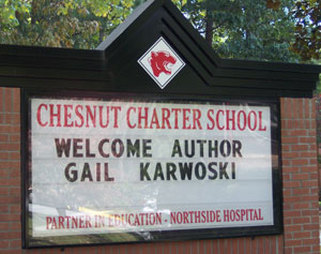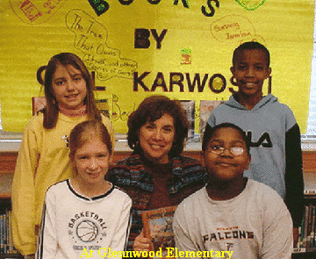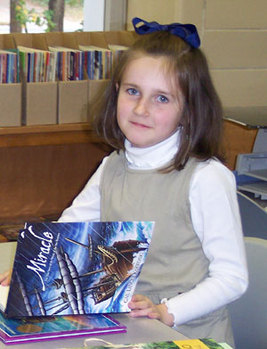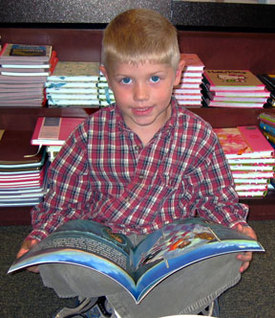How To Organize an Author Visit
Remember, It's All About the Details

Headache Remedy: Start Early
The earlier you begin, the easier your planning will be. Some school library media specialists arrange the next year’s author visit BEFORE they leave for summer vacation! If you know you want an author visit on specific dates (especially if you hope to have an author visit during popular events, such as National Library Week or Dr. Seuss’s birthday), go ahead and make your arrangements before you leave for summer break. You will breathe a sigh of relief knowing that you’ve reserved the author you want for the date that works best for your library program.
If you cannot book that far ahead, then try to arrange the visit at least 2 months early. Since an author visit is costly - both in terms of funding and effort – you will want to maximize the experience for your students. You won’t want to ignore any possibilities because you ran out of time.
Big Game Hunting: Track Down an Author
The easiest way to track down an author is to “piggyback” on the experiences of colleagues in your area. Send out a group email to librarians in your school district and ask for recommendations. Have any of them arranged an author visit recently? Was the author a lively speaker? Did s/he have a good rapport with students? Colleagues can also give you a “heads up” about that author’s stipend and what sort of equipment/arrangements were necessary.
If you cannot get recommendations from colleagues, how do you find an author? The best resource is the internet. Most publishers have websites, and they list their authors who do school visits. You can use a search engine, like Google, and plug in “Children’s Author,” “Author in School,” “Georgia Children’s Author,” etc. Or, better yet, Google the names of authors who have written books that your students are enjoying. These days, most authors have websites, and information about their school visits will be on their websites. Check out this website for lists of authors by states:
http://www.authorvisitsbystate.com
Sometimes, a nearby bookstore will help to arrange author visits to schools. These stores will try to coordinate with several schools so that an out-of-town author has a string of visits in one area and transportation costs for each school are minimized.
Another idea: If there are state reading or library conferences in your area, contact the organizers (find their email addresses on the organization’s website) and ask for the names and contact info for the children’s authors who are scheduled to speak. Since conference appearances are often unpaid, these authors will appreciate adding a school visit to their trip itinerary.
The earlier you begin, the easier your planning will be. Some school library media specialists arrange the next year’s author visit BEFORE they leave for summer vacation! If you know you want an author visit on specific dates (especially if you hope to have an author visit during popular events, such as National Library Week or Dr. Seuss’s birthday), go ahead and make your arrangements before you leave for summer break. You will breathe a sigh of relief knowing that you’ve reserved the author you want for the date that works best for your library program.
If you cannot book that far ahead, then try to arrange the visit at least 2 months early. Since an author visit is costly - both in terms of funding and effort – you will want to maximize the experience for your students. You won’t want to ignore any possibilities because you ran out of time.
Big Game Hunting: Track Down an Author
The easiest way to track down an author is to “piggyback” on the experiences of colleagues in your area. Send out a group email to librarians in your school district and ask for recommendations. Have any of them arranged an author visit recently? Was the author a lively speaker? Did s/he have a good rapport with students? Colleagues can also give you a “heads up” about that author’s stipend and what sort of equipment/arrangements were necessary.
If you cannot get recommendations from colleagues, how do you find an author? The best resource is the internet. Most publishers have websites, and they list their authors who do school visits. You can use a search engine, like Google, and plug in “Children’s Author,” “Author in School,” “Georgia Children’s Author,” etc. Or, better yet, Google the names of authors who have written books that your students are enjoying. These days, most authors have websites, and information about their school visits will be on their websites. Check out this website for lists of authors by states:
http://www.authorvisitsbystate.com
Sometimes, a nearby bookstore will help to arrange author visits to schools. These stores will try to coordinate with several schools so that an out-of-town author has a string of visits in one area and transportation costs for each school are minimized.
Another idea: If there are state reading or library conferences in your area, contact the organizers (find their email addresses on the organization’s website) and ask for the names and contact info for the children’s authors who are scheduled to speak. Since conference appearances are often unpaid, these authors will appreciate adding a school visit to their trip itinerary.
Stress-Less Scheduling - The Where & When

After you find an author, what’s next? Scheduling time and place.
Before you settle on the day of your author visit, check your school and district calendar and talk to your principal. Try to arrange the visit on a day when there are no other events - no field days, school pictures, class field trips, statewide testing, early dismissal for conferences, etc.
Most authors are willing to offer 3 or 4 programs during a school day. The programs will range from 30 to 60 minutes each. Ask the author if s/he sets a maximum audience size.
Plan to hold the programs in the most “conducive” room at your school. Generally, this is the media center. What better place to celebrate books and reading?
But some media centers are too small or the permanent placement of the bookshelves does not allow an open area for a program. If the media center won’t work, how about a “multi-purpose room”? Other possibilities? Some schools have a “cafetorium,” with a stage. Or a “gymnatorium.” (Honestly, both cafeteria and gym are not-so-great places for author programs. In the cafeteria, you will need to schedule around breakfast and its cleanup, as well as lunch and its cleanup. Remember that a cafeteria is usually very noisy – the freezers hum, the workers thump and rattle as they wash dishes and prepare lunch. The gym presents other problems – this room may not be air-conditioned/heated, the bleachers are uncomfortable and far from the screen, and acoustics are awful. But if all your school can provide is a cafeteria or gym, that’s better than nothing. Plan accordingly: Provide a microphone for the author. Consider seating the students on the floor close to the speaker so they can hear and see.)
Try to arrange the day’s schedule so that students in the same/adjacent grades will attend the author’s program together. An experienced author will adapt his/her program to the age of the listeners, so don’t mix 1st graders in with 5th graders. Try to schedule the programs to avoid upsetting lunch, recess, and activity class (when classroom teachers have their “free period”) schedules. Allow at least 10 minutes between programs so one group can leave the room before the next group enters.
How long should you allow for each program? Ask the author if s/he has a preference. In general, K-1 programs should run about 30 minutes. Students in grades 2 & 3 can sit still to enjoy a 45-minute program. Grades 4 and older can usually be attentive for 60 minutes.
To keep the schedule running smoothly, you need to be sure that all equipment is set up and in working order BEFORE the author arrives. (Don’t forget extension cords!) Monitor the classes as they arrive for the program. If one class is late, quickly send a runner to remind the tardy teacher(s). If students are going to sit on the floor, tape the seating boundaries and direct each class to a space as they arrive.
If you are planning to introduce the author, be sure your introductory remarks are brief. Remind the students to hold their questions until the end of the program.
Before you settle on the day of your author visit, check your school and district calendar and talk to your principal. Try to arrange the visit on a day when there are no other events - no field days, school pictures, class field trips, statewide testing, early dismissal for conferences, etc.
Most authors are willing to offer 3 or 4 programs during a school day. The programs will range from 30 to 60 minutes each. Ask the author if s/he sets a maximum audience size.
Plan to hold the programs in the most “conducive” room at your school. Generally, this is the media center. What better place to celebrate books and reading?
But some media centers are too small or the permanent placement of the bookshelves does not allow an open area for a program. If the media center won’t work, how about a “multi-purpose room”? Other possibilities? Some schools have a “cafetorium,” with a stage. Or a “gymnatorium.” (Honestly, both cafeteria and gym are not-so-great places for author programs. In the cafeteria, you will need to schedule around breakfast and its cleanup, as well as lunch and its cleanup. Remember that a cafeteria is usually very noisy – the freezers hum, the workers thump and rattle as they wash dishes and prepare lunch. The gym presents other problems – this room may not be air-conditioned/heated, the bleachers are uncomfortable and far from the screen, and acoustics are awful. But if all your school can provide is a cafeteria or gym, that’s better than nothing. Plan accordingly: Provide a microphone for the author. Consider seating the students on the floor close to the speaker so they can hear and see.)
Try to arrange the day’s schedule so that students in the same/adjacent grades will attend the author’s program together. An experienced author will adapt his/her program to the age of the listeners, so don’t mix 1st graders in with 5th graders. Try to schedule the programs to avoid upsetting lunch, recess, and activity class (when classroom teachers have their “free period”) schedules. Allow at least 10 minutes between programs so one group can leave the room before the next group enters.
How long should you allow for each program? Ask the author if s/he has a preference. In general, K-1 programs should run about 30 minutes. Students in grades 2 & 3 can sit still to enjoy a 45-minute program. Grades 4 and older can usually be attentive for 60 minutes.
To keep the schedule running smoothly, you need to be sure that all equipment is set up and in working order BEFORE the author arrives. (Don’t forget extension cords!) Monitor the classes as they arrive for the program. If one class is late, quickly send a runner to remind the tardy teacher(s). If students are going to sit on the floor, tape the seating boundaries and direct each class to a space as they arrive.
If you are planning to introduce the author, be sure your introductory remarks are brief. Remind the students to hold their questions until the end of the program.
Create Lifelong Readers: Books & Autographing

Most schools offer the author’s books for sale on the day of the
visit. This is a wonderful opportunity to create lifelong readers. When a
book is personally autographed by the author - by THE author that a
child has met - it becomes a very special keepsake. From that day on,
that particular book and its author “belong” to that child. This
ownership can forge a relationship between child and book that may last a
lifetime and generalize to all books.
How do you arrange for books sales during an author visit? Begin by asking your principal if this is permitted in your district and at your school. If you get the go-ahead, then you have 3 choices:
1) Contact a local bookstore and ask if they are willing to order books
2) Contact the publisher and ask if they will ship books (and a shipping label for returning unsold copies)
3) Ask the author if s/he will bring along books when they visit
Don’t be shy! Ask the bookstore, publisher, or author if they will supply books at a discount. Then you can sell the books at full price and make some money to defray the cost of the visit. Sometimes, schools sell enough books to pay for the entire cost of the author visit! Or you can pass the discount on to your students/faculty.
Get yourself a helper. If your media clerk is organized, delegate the record-keeping for booksales to him/her. Or ask a dependable parent-volunteer to take charge. This person will keep track of advance orders, sort the orders by homeroom, be sure that checks are written for the correct amount, bring the money to the office for safe-keeping, etc.
About two weeks before the author visit, send home an order form to parents (perhaps in each student’s “Friday folder”). The form should have a space for the student’s name & homeroom, a brief description of each book for sale and its price, and instructions about how the book should be autographed (ie; to Susie; Merry Christmas, Annie and Bill; to the Henry family)
Remind the students (on the morning announcements?) to return the advance-order-forms to the media center. Advance orders are easier to handle than a flood of orders on the day of the author visit, so encourage students to get their forms returned early.
How do you arrange for books sales during an author visit? Begin by asking your principal if this is permitted in your district and at your school. If you get the go-ahead, then you have 3 choices:
1) Contact a local bookstore and ask if they are willing to order books
2) Contact the publisher and ask if they will ship books (and a shipping label for returning unsold copies)
3) Ask the author if s/he will bring along books when they visit
Don’t be shy! Ask the bookstore, publisher, or author if they will supply books at a discount. Then you can sell the books at full price and make some money to defray the cost of the visit. Sometimes, schools sell enough books to pay for the entire cost of the author visit! Or you can pass the discount on to your students/faculty.
Get yourself a helper. If your media clerk is organized, delegate the record-keeping for booksales to him/her. Or ask a dependable parent-volunteer to take charge. This person will keep track of advance orders, sort the orders by homeroom, be sure that checks are written for the correct amount, bring the money to the office for safe-keeping, etc.
About two weeks before the author visit, send home an order form to parents (perhaps in each student’s “Friday folder”). The form should have a space for the student’s name & homeroom, a brief description of each book for sale and its price, and instructions about how the book should be autographed (ie; to Susie; Merry Christmas, Annie and Bill; to the Henry family)
Remind the students (on the morning announcements?) to return the advance-order-forms to the media center. Advance orders are easier to handle than a flood of orders on the day of the author visit, so encourage students to get their forms returned early.
Get Excited: Spread the Word

An author visit will be more meaningful if students are excited and prepared. How can you stir up some excitement?
- Get several copies of the author’s books and book-talk them during class visits to the media center in the weeks before the visit.
- Read excerpts from the author’s books during morning announcements.
- Show a book trailer on the morning announcements or when classes come to the library.
- Download a biography of the author and copy/distribute it to teachers at a faculty meeting..
- Circulate some of the author’s books among teachers and ask them to read a book aloud before the author visit.
- Put up a bulletin board displaying the author’s book covers in a busy hallway.
- Offer a prize for the best essay, “Why do you want to eat lunch with this author?” Choose the best entries from each grade and arrange a lunch with the author in the media center.
- Have a “quiz-bowl” drawing: During morning announcements, ask a question about one of the author’s books. Tell students to write their full name, homeroom, and the answer on a slip of paper, then drop it in a bowl in the media center. At the end of the day, draw one slip; if it contains a correct answer, that student wins a paperback copy of one of the author’s book, a place at the author luncheon, etc.
Just in Case: Emergency Plans
Even the most careful-planned event can hit a snag. Swap home and mobile phone numbers with the author in case there’s a last-minute difficulty, like a traffic jam or the author gets lost en route to the school.
- Get several copies of the author’s books and book-talk them during class visits to the media center in the weeks before the visit.
- Read excerpts from the author’s books during morning announcements.
- Show a book trailer on the morning announcements or when classes come to the library.
- Download a biography of the author and copy/distribute it to teachers at a faculty meeting..
- Circulate some of the author’s books among teachers and ask them to read a book aloud before the author visit.
- Put up a bulletin board displaying the author’s book covers in a busy hallway.
- Offer a prize for the best essay, “Why do you want to eat lunch with this author?” Choose the best entries from each grade and arrange a lunch with the author in the media center.
- Have a “quiz-bowl” drawing: During morning announcements, ask a question about one of the author’s books. Tell students to write their full name, homeroom, and the answer on a slip of paper, then drop it in a bowl in the media center. At the end of the day, draw one slip; if it contains a correct answer, that student wins a paperback copy of one of the author’s book, a place at the author luncheon, etc.
Just in Case: Emergency Plans
Even the most careful-planned event can hit a snag. Swap home and mobile phone numbers with the author in case there’s a last-minute difficulty, like a traffic jam or the author gets lost en route to the school.